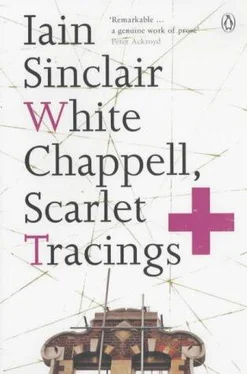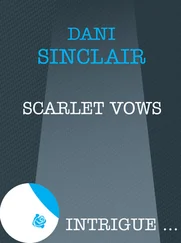‘If my description of this condition, which ran to no more than five pages, had sufficient elegance and was correctly formed and argued then the experiments that followed were unnecessary, yes. But they were carried through to cancel what I had written. I was by that time exclusively involved with uninventing my own history. The traces of acts are cruder than the traces of concepts. I left five cretins to live at my charge, freely and without harm, instead of leaving alive the possibility of my theoretical proposals being acted on by five-and-twenty bunglers, who could not open a laundry bag between them with their scalpels.
‘I would leave a city of female cretins if I could absolutely erase the work that I have done. Ignorance is the only safety. I have done what was required of me. I say again that I have redeemed my time. I did not fulfil this commission merely to cancel some irritation or threat to those in power, on whose power we all depend. I aborted that insult — but it was of no importance. I acted out the description of an act that was always there. And in doing this I erased it. I freed that space. It could not be left to madmen, prophets, millennial tremblers.
I have hacked out an infected womb that would have bred monsters. But my acts failed. I did not see that they would themselves form the shape of a new myth, and that in removing the outline of the old fear I was planting a spoor of heat that would itself need to be brought to earth, chilled to immobility, stopped. The myth kills the myth; makes new, infinite rings, smoke above the white stones. I would unhinge the cap of my skull and let the stars pull wires from my brain. This is a terrible matter. Doctors, wake up !’
He spoke with his back to them, but it did not signify. The light was gone from him. A froth remained; grape-juice staining to purple his full lips.
‘“For this must ever be
A secret, kept from all the rest,
Between yourself and me.”’
The Tylers came.
Sir William Withey Gull was committed to St Mary’s Hospital, Islington, in the name of Thomas Mason. Was given the number, 124. Nothing more is known. The rumours from here on are all lies. The screams in the night are false theatre. In that decayed zone, hidden on a hilltop, in windblown paper, among hoardings and estate agents, there was no Gull. He was flown.
A nautilus inquisition.
The Zest of Endurance. Joblard splits in the uneven panels of a long mirror. Pin-ups and moonshot advertisements on either side of him. He is swallowed in the red pads of the machine; forced breath. He emerges. Huge thighs enclose him. He drives free. Dynamic tension expelled with a lion’s roar. He lies upon a board, dragging down a weighted bar. He does the circuit, swallowing his own air; relishing the new mysteries of pain.
At this early hour the gym is his. His young son playing with a blue motorbike, not concerned with these gruntings and strivings. The massacre of the previous self, the willed annihilation of past histories of accepted limits and boundaries, continues. Thoracic expansion driving out images of repression. Again: forcing the set weights, the manifested moral obstacles.
The quest is simplified and brought to the scale of this playpen: the sculpted machines of steel and chrome and leather; their chains and balances are for use. The studio is in some way made redundant. The acts are repeated, with no trace, beyond sweat and the changing body armour. It is not that anything new emerges — but that old inhibitions are removed.
The skin softens, becomes childlike. Heaving himself from the floor of London. But the true child, strapped in his buggy, is much more ancient, intent. He is open to it all, it still flows through him and around him, no barriers, nothing to keep out: he is contained.
The father’s head split by the mirror; deformed hemispheres. And the back of the child’s head above him. And the moon photograph with the text printed on the reverse showing through as a fault, or stain. And the black doorway with the waiting watcher.
I cannot work up the generosity to suffer this; not for the obvious taints and shower-stall risks, but because I prefer other fate games. There is a polarity of risk in this elimination of comfortable flaws that is useful to Joblard: he has decided to Stalinise his personal history, to re-edit the past. It will appear to be whatever he wants it to be.
The flame is high, but new energies are running into him. To be and not to do. The world was defended by what he made and now he has to keep place in it without these weapons. The objects, accretions, the tools of a false magic are abandoned. He is unhoused. Like Nicholas Lane, he wills his absence from the world. He is erased.
But the child, effortlessly, announces his presence, like the first sentence of Moby Dick , such apparent simplicity; it is hardly noticed, but it is final. There. And everything changes by it. The Leviathan is fatally marked, invisibly wounded, brought down. The richest fault in time is the least seen. This ancestor, in his striped-bundle, is sleeping. The head nods over, already weighted.
At the back of Guy’s Hospital, between Newcomen and Snows-field, at the corner, in Great Maze Pond is a red brick building, coded with roses and with fruits, once a private ward, now a gym.
The sign ‘ New Outpatients Department ’ is still fresh; but that function has already been terminated. Gull’s asylum has closed its doors, last refuge of the least pained; they lock their gates to preserve the status of the doctors. Hospitals translate into gymnasia: members only, boxers, bull-workers, narcissists, cruisers. The facilities include steam baths, that alternate their use between the men and the ladies, with profitable confusion: also a bar.
The child is still out; we take our breakfast coffee.
Involuntarily returning to our past, to the fables we construct out of it. On the river. Tooley Street. I once had a job re-labelling cans of condemned Argentine beef. It was one of the few manual tasks at which I excelled. Worked up to a speed that began to alarm the management. The mountain of silver reduced in a few hours to exhibitionist lines with gleaming new wrappers, all ready for the supermarket shelves. The fact that I was helping to put high risk merchandise into the mouths of babes and sucklings in no way inhibited my performance. I liked where I was. Unknown: I fell into the task. Took my breaks on the riverside, saw the city on the far bank, coming up out of the mud, a sediment of its own memory.
Metal detectives probed the foreshore, eyes down. Truant children made rings out of broken stones. The river eliminates itself, heavy with its repeated lies. Montague Druitt, a victim, taken into the fringe of Ripper mythology, found himself here. Self-assassin only. Swimming out, his pockets filled with pebbles.
Joblard again suffers my ramblings, graciously. A surface calm of near collapse: he checks the sleeper.
‘The hospital, that theatre, contains its secret history in its bland outward architecture. The forecourts, quadrangles, iron gates and chapels disguising frenzy and fear. You know that it was founded by a bookseller who made his money speculating in South Sea stocks? The nervous occultism of the merchant again: trading in invisibles. The walls are calcined books.’
Joblard stretches his long jaw, a yawn of suspicion. His boots no longer tapping under the table. Temporary ease. No scratching. A thumb nail grazing the stubble.
‘Lies are the only way of getting at the truth. What we know is so stamped down, walked over, familiar — its power is gone.
‘We can’t just carry on repeating the same myths: until we arrive at a fresh version. An authentic replica of our own making.
Читать дальше












